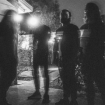The multiverse is having a moment — an infinitude of them, if you will. Thanks to Marvel's recent batch of mind-warping blockbusters, parallel realities have fully entered the zeitgeist. But the concept is nothing new to Holy Fawn's Ryan Osterman. The guitarist-vocalist has been captivated by the boundless planes of existence since before he even lost his baby teeth.
Osterman's fascination can be traced back to age four, when he watched a Discovery Channel documentary that introduced him to the concept of death, via a poisonous fish that puts prospective predators into fatal, anaphylactic shock. When the young boy grilled his father on what that meant, exactly, the answer ripped apart his notion of reality.
"'Well, you basically go to sleep and never wake up,'" Osterman recalls his father telling him. "I remember freaking out, running to the bathroom and crying, and my dad was just like, 'It's OK! I'm going to die; your mom's going to die; you're going to die; everyone's going to die!' It… shook me up a little bit." He laughs.
At 33, Osterman's interest in those varying planes now manifests throughout his Arizona outfit's latest full-length, Dimensional Bleed. From a sonic standpoint, you could look at how the quartet ambitiously phases between the abrasive contours of metal towards a turquoise glow of Sigur Rós-leaning post-rock, a genre-stumping feat that has made a fan out of Lamb of God's Randy Blythe and earned them spots opening for Deafheaven and Thrice.
Per the lyrics of Dimensional Bleed's "Void of Light," Osterman continues to contemplate what happens once you've entered a state of "eternal sleep." The album also explores simultaneously existing timelines, as well as the differences in perception between nightmares and the waking mind. Osterman confesses to being an indecisive person, but when you consider how each of life's decisions has the potential to place you on an infinite number of different paths, you can hardly blame him.
"I think about my own life," he continues, "What if I made [a] different choice at whatever point in my life — where would I be at this age, in that different timeline? Would it intersect again with this? It's such an abstract concept, but it's something that resonates with me."
Luckily, working with Holy Fawn has Osterman less panicked about the unknown than his younger self. These days, he's attempting to make sense of the intangible through meticulously crafted, heavily melodic and gorgeously distortion-laced songs. Take Dimensional Bleed's first slow-boiling single, "Death Is a Relief," wherein the musician pontificates on transitional states, and the "struggle of existing when it felt so much better to let go."
"Lyrically, the song is depressing as fuck, obviously," Osterman says of the tune, later adding of Holy Fawn's broader exploration of death: "We don't really know a lot about it. We treat it so macabre [while] we treat birth with this profound amazement, like how it's this glorious miracle. I feel like death should be treated the same way. It could be [interpreted as] anything from rebirth, [to a] transcendence into something even better."
Holy Fawn, themselves — Osterman, guitarist Evan Phelps, bassist-vocalist Alexander Rieth and drummer-vocalist Austin Reinholz — have progressively leveled up since forming in Tempe in 2015. While they'd all grown up performing in various groups within the Arizona underground music scene, Osterman, Phelps and Rieth came together while working at a local guitar shop.
They loathed their shared retail experience, but connected over a love of post-rock, shoegaze and metal. When the trio set up a jam session along with Rieth's drummer roommate, the initial meeting morphed into a euphoric, six-hour practice. Stricken by the connection, they opted to lock in as Holy Fawn, and delivered the six-song Realms EP that same year. By 2018, their debut album, Death Spells, gained wide acclaim over its passionate post-metal crescendos, as well Osterman's swirl of ethereal whispers and punctured-lung shrieks. They later worked with engineer-producer Matt Bayles (Mastodon, Botch) for 2020's follow-up EP, The Black Moon.
Through it all, Holy Fawn have tried to eschew traditional genre tags in favor of a bluntly evocative aesthetic slogan: Loud Heavy Pretty Noises. "We could be like, 'Oh, it's ambient, doomgaze post-rock, with some indie,' [but] you lose someone after the first couple of [genres]," Osterman explains. "Loud Heavy Pretty Noises… that's perfect! That's all you need to hear."
In the past, the guitarist-vocalist had plotted out Holy Fawn tunes on an acoustic guitar before adapting them into a full-band crush. With Dimensional Bleed, the quartet's chief songwriter charted off into unknown territory by beginning with a series of ambient electronic washes — those impressionistic, synthesized undulations heard bubbling beneath melancholy guitar explosions like "Empty Vials." The electronic bedrock also entwines with Osterman's penchant for fertile, organic lyricism, whether detailing constrictive vines ("Blood Memory") or bodies being reabsorbed into a mossy meadow ("Void of Light").
Despite such lush backdrops, Osterman grew up on the outskirts of Phoenix, and often spent nights wandering into the arid wilderness with his brother. A golf course was somewhat nearby, but his home was miles removed from a gas station or grocery store.
"I was at the very end of the road," he recalls. "You'd walk 10-15 minutes [further] and see all these wooden little dead-end barricades; [from there] it was just mountainous desert. There are rattlesnakes and javelinas. When I was in high school, I'd be driving down the road and you'd pump the breaks because there's a coyote just standing in the road. At night, you'd hear the wind and the wildlife."
"It's sadly not that way anymore," he continues. "I think the last time I was there they had expanded and built a freeway through a mountain. It's kind of depressing to see what it became."
Over the years, natural landscapes have shifted around Osterman, while Holy Fawn's songwriting process has likewise progressed. One thing that has stuck with him, though, is his interest in the afterlife. Death permeates Dimensional Bleed, and, sadly, it's also been a recurring theme throughout Osterman personal life. The musician explains that there have been multiple suicides in his family, and he also notes that a close friend and early musical collaborator suffered a fatal overdose in their freshman year of high school.
"I've been surrounded by death for a ton of my life," Osterman reveals. "I hate saying that, because I feel like everyone has and it doesn't make my experience any more potent than anyone else's. I don't know if it's a coping mechanism, but [death] is very important in my life. It's something that I think about and write about."
While still full of unknowns, art has helped Osterman sit with the concept of death. At a young age, his mother introduced him to the darker, mortality-contemplating poetry of Edgar Allan Poe, and his current lyrical meditations within Holy Fawn have grappled with similar themes. Though Osterman concedes that none of Dimensional Bleed's musings on death speak to any specific situation, he acknowledges there is still comfort to be drawn as he wonders what happens when we cross over the threshold to the hereafter.
Absolutes are nevertheless hard to pin down, but at its most optimistic, "Hexsewn" and "Blood Memory" bookend Dimensional Bleed with a softly sung hope for what's to come: "I'll find you again in some other life."












